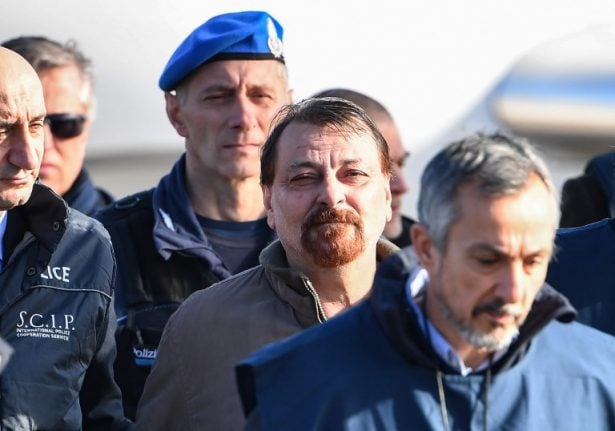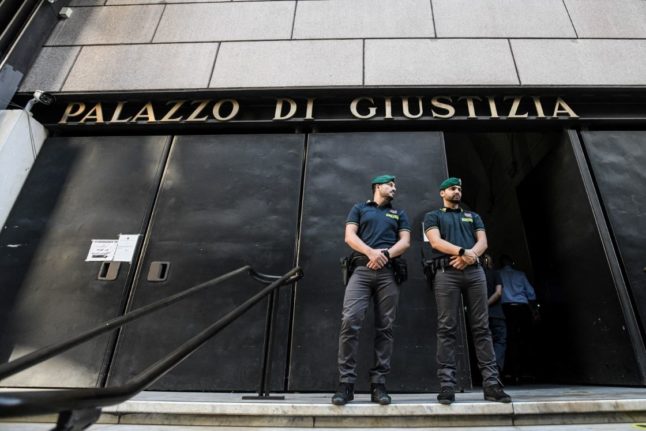Jailed in 1979 for belonging to an armed revolutionary group outlawed in Italy, Battisti escaped from prison two years later, and has spent nearly four decades on the run.
An Italian-flagged Falcon 900 plane carrying Battisti landed at Rome's Ciampino airport on Monday morning. Battisti, who was not wearing handcuffs, smiled grimly as he was escorted off the plane by a dozen policemen.
He was expected to be taken to Rome's Rebibbia jail, where according to media reports he will begin life behind bars with six months' solitary confinement.
READ ALSO: How Cesare Battisti fled Italian justice for almost four decades

Photo: Bolivian Police/AFP
“In the name of 60 million Italians, I want to thank law enforcement for having given us this ray of sunlight, this hope, this certainty, this renewed faith in justice,” Italy's Interior Minister Matteo Salvini told journalists at the airport.
“This is not the finish line but the starting point,” Salvini said, citing the presence of “dozens” of other former militants still on the run in countries from Latin America to France.
Aereo con #CesareBattisti decollato adesso direzione Italia: sono orgoglioso e commosso! pic.twitter.com/lWWWZkubsl
— Matteo Salvini (@matteosalvinimi) January 13, 2019
Italy had repeatedly sought the extradition of Battisti, who lived in Brazil for years under the protection of former leftist president Luiz Inacio Lula da Silva, himself now in prison for corruption.
Battisti, 64, was seized late Saturday in the Bolivian city of Santa Cruz de la Sierra in an operation carried out by a joint team of Italian and Bolivian officers, Italian state police said.
READ ALSO: Ex-militant Cesare Battisti arrested in Bolivia
The 64-year-old fugitive could be seen walking casually about Santa Cruz in sunglasses and a blue T-shirt, in surveillance footage taken hours before his capture. He gave up without a struggle, according to Italian government sources.
“We've got him. And now he'll have to rot in jail. He's a Communist terrorist. A killer. A coward,” said Salvini.
Battisti was sentenced to life imprisonment for having killed two Italian policemen, taking part in the murder of a butcher and helping plan the slaying of a jeweller who died in a shootout that left his teenage son in a wheelchair.
“It's over, now the victims can rest in peace,” said Alberto Torregiani, the son of the slain jeweller. “It should have happened years ago.”

Interior Minister Matteo Salvini (L) and Justice Minister Alfonso Bonafede wait for Battisti to arrive in Rome. Photo: Alberto Pizzoli/AFP
Battisti has admitted to being part of the Armed Proletarians for Communism, a radical group which staged a string of robberies and attacks, but has always denied responsibility for any deaths, painting himself as a political refugee.
However, Rome remains determined to punish one of the last figures from Italy's so-called Years of Lead, a decade of violent turmoil which began in the late 1960s and saw dozens of deadly attacks by hardline leftwing and rightwing groups.
Italian Prime Minister Giuseppe Conte said in a Facebook post that he had expressed gratitude to Brazil's recently inaugurated President Jair Bolsonaro in a telephone call. During his presidential campaign the far-right Bolsonaro — who took office on January 1st — vowed that if elected he would “immediately” send Battisti back to Italy.

Battisti is escorted off the plane by Italian police. Photo: Alberto Pizzoli/AFP
Battisti had filed for asylum without receiving any response from authorities, Bolivia's ombudsman said in an article published in the local El Deber de Santa Cruz newspaper.
He had been hoping to find favour with Bolivia's left-wing President Evo Morales after saying in his asylum request that he'd been forced to quit Brazil due to “the ominous coincidence” that Italy and Brazil were both now run by “far-right” governments.
Salvini thanked the Italian and foreign police who captured “a delinquent who did not deserve the comfortable life on the beach, and who should spend the rest of his days in prison”.
Bolsonaro's son, Brazilian lawmaker Eduardo Bolsonaro, tweeted in Italian with a picture of Battisti: “Brazil is no longer the land of bandits. Matteo Salvini, the 'little gift' is on its way.”
(ITA) Il Brasile non è più terra di banditi. @matteosalvinimi , il “piccolo regalo” è in arrivo ?? ✈️ pic.twitter.com/vbsHBTZ2Pc
— Eduardo Bolsonaro (@BolsonaroSP) January 13, 2019
Since his jailbreak Battisti has reinvented himself as an author, writing a string of noir novels. In 2004, he skipped bail in France, where he had taken refuge. He then went to live clandestinely in Brazil until he was arrested in 2007 in Rio de Janeiro.
After Battisti had spent years in custody, then-president Lula issued a decree — later upheld by Brazil's Supreme Court — in 2010 refusing his extradition to Italy and he was freed, angering Rome.
Battisti, who has a five-year-old Brazilian son, last year told AFP he faced “torture” and death if he were ever to be sent back to Italy.
READ ALSO: Who is Cesare Battisti, the convicted murderer who spent a life on the run?

Photo: Miguel Shincariol/AFP
By AFP's Ella Ide



 Please whitelist us to continue reading.
Please whitelist us to continue reading.